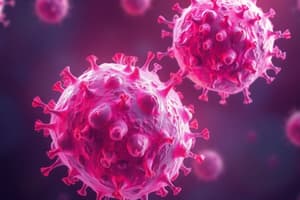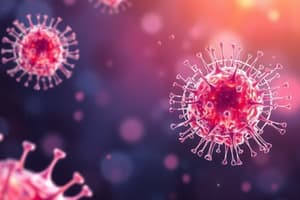Podcast
Questions and Answers
What type of cytokines are produced by activated Th2 cells that affect antibody production?
What type of cytokines are produced by activated Th2 cells that affect antibody production?
- IFN-γ, IL-12, IL-15
- IL-4, IL-5, IL-6 (correct)
- IL-10, IL-13, TNF-α
- IL-1, IL-2, IL-3
What is the role of the Th1 cytokine IFN-γ in relation to B cells?
What is the role of the Th1 cytokine IFN-γ in relation to B cells?
- Activates cytotoxic T cells
- Stimulates isotype switching to IgG1 (correct)
- Promotes apoptosis of B cells
- Inhibits antibody production
How are conjugate vaccines designed to enhance immunity to polysaccharides?
How are conjugate vaccines designed to enhance immunity to polysaccharides?
- By introducing DNA fragments from the pathogen
- By using only polysaccharides in the vaccine
- By linking polysaccharides to a protein (correct)
- By using live attenuated bacteria
Granulomas are characterized by the presence of which type of cells?
Granulomas are characterized by the presence of which type of cells?
What is the outcome when polysaccharides are presented in a T cell-independent manner?
What is the outcome when polysaccharides are presented in a T cell-independent manner?
What determines the lineage commitment of CD4 T cells in response to a pathogen?
What determines the lineage commitment of CD4 T cells in response to a pathogen?
Which cytokine is produced by APCs to induce a Th1 response?
Which cytokine is produced by APCs to induce a Th1 response?
What is the primary role of IFN-γ in the Th1 immune response?
What is the primary role of IFN-γ in the Th1 immune response?
Which statement regarding the Th1 and Th2 immune responses is accurate?
Which statement regarding the Th1 and Th2 immune responses is accurate?
What is the consequence of macrophages infected with mycobacteria in the context of the immune response?
What is the consequence of macrophages infected with mycobacteria in the context of the immune response?
How does the JAK:STAT pathway relate to CD4 T cell differentiation?
How does the JAK:STAT pathway relate to CD4 T cell differentiation?
What is the role of antigen-presenting cells (APCs) in T cell differentiation?
What is the role of antigen-presenting cells (APCs) in T cell differentiation?
What primarily affects the flexibility of mature T cells in responding to various pathogens?
What primarily affects the flexibility of mature T cells in responding to various pathogens?
Flashcards are hidden until you start studying
Study Notes
CD4 T Cell Commitment
- CD4 T cells can differentiate into various effector lineages: Th1, Th2, and Th17.
- These lineages are determined by the cytokine environment in the lymph node during initial antigen presentation.
Signaling Through Cytokine Receptors
- The JAK:STAT pathway is involved in signaling through cytokine receptors.
CD4 T Cell Fate Determined in Lymph Node
- Effector cells return to the site of infection after initial commitment in the lymph nodes.
- Antigen-presenting cells (APCs) influence CD4 T cell lineage commitment based on the specific pathogen.
- This allows for flexibility in the immune response, enabling the host to combat different pathogens effectively.
Cytokine Milieu Determines CD4 T Cell Fate
- The cytokine milieu dictates whether a CD4 T cell develops into a Th1, Th2, or Th17 lineage.
Polarizing Immunity Toward a Specific Pathogen
- The Th1:Th2 paradigm illustrates how cytokines produced during one response can inhibit the development of the other.
- Th1 responses are associated with intracellular pathogens like viruses and bacteria.
- Th2 responses are associated with extracellular pathogens.
Classical and Alternative Macrophage Activation
- Macrophages exhibit different activation states based on the cytokine environment.
Destruction of an Intracellular Pathogen
- APCs infected with intracellular bacteria induce Th1 immunity.
- The infected APC presents bacterial peptides on MHC-II and produces IL-12, triggering Th1 differentiation.
- Th1 cells express CD40 ligand and produce IFN-γ, which instruct the APC to kill the intracellular bacteria.
Granuloma Formation
- Mycobacteria, such as those causing tuberculosis, can survive within macrophages and resist Th1-mediated killing.
- This leads to the formation of granulomas, characterized by multinucleated giant cells (fused macrophages) and surrounding T cells.
Multiple Effects of Activated Th1 Cells on The Host
- Th1 cells have multiple effects on the host immune system.
- They promote macrophage activation and intracellular pathogen killing.
- They can also trigger production of antibodies.
Production of Antibodies
- Th2 cells produce cytokines (IL-4, IL-5, IL-6) involved in antibody isotype switching.
- IFN-γ (a Th1 cytokine) can stimulate isotype switching towards IgG1 antibodies, enhancing opsonophagocytosis and complement fixation.
Hapten:Carrier Systems and Conjugate Vaccines
- Polysaccharides cannot be presented to T cells, making T cell-independent immunity crucial.
- Conjugate vaccines combine polysaccharides with a protein (like tetanus toxoid) to enhance immunity.
- The protein portion acts as a T-cell epitope, leading to T cell activation and antibody production directed towards the polysaccharide.
Studying That Suits You
Use AI to generate personalized quizzes and flashcards to suit your learning preferences.



